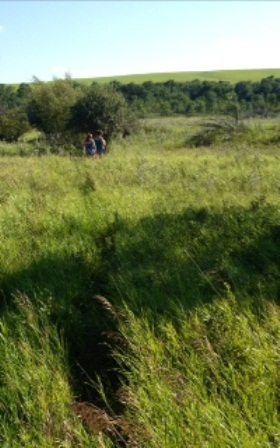Listening with Story
I am a storyteller. I love listening to stories.
When I was a young girl I’d follow my Dad and my sister on treks as they talked plant botany, Dad pausing every once in a while to turn and change the science into narrative, “Wolf willow has an interesting story.” He’d stand feet planted shoulder-width apart, take off his well-warn Tilly hat with the Russian thistle tucked into its fold, wipe his brow with his forearm, look off over the prairie and something magical would happen. He’d listen for story to come.
Often, my sister, then three big long years older, would fill in these stories. How had she heard them? I’d sometimes remember to wonder, but then, too often I’d be too busy to notice. I’d have fallen behind, playing in brome grass, savouring rose hips, snoozing among sagebrush, until Dad paused. Yet eventually, I’d know.
Dad taught me to listen. He taught me to follow.
What I found difficult was leading with story.
A while back another adult told me to “pretend” that I’ did not hear a student’s personal story. When I’d heard “pretend” I was stunned. My first thought was that I had misunderstood the adult’s words. I asked the person to clarify.
Pretend not to have heard.
I remember how I felt.
Had this person not noticed the way I interact with student? Kids are often stopping by our classroom space for hugs, or to hang out, to chat. The comforting space that lives between students and myself doesn’t only happen in our classroom, it travels with us, wherever we are. Often this confuses people, the ease the students and I have with each other.
How could anyone not understand the way I live among kids and their stories?
So I asked for clarification a third time.
I had not been listing to a student’s easy story. I had been listening to a difficult story. These are the silenced stories that school spaces often keep hidden behind principals’ closed doors, around staffroom tables and in documents filled out and filed in cabinets, silenced by folks who spend little time actually attending to people/kids.
When I was in elementary school I failed a grade. It took me decades to be able to share that story. When I failed grade five in French Immersion and moved into the English program, you bet I pretended for a long long while. I told counterstories about why I was at a different school in my own neighbourhood. Clandinin et al explain counterstories; “These stories are rooted temporally as individual stories shift and change in response to changing events and circumstances” (2006).
I pretended.
Today I knowingly try not to craft counterstories about my elementary years. I share these stories because often, I’ll sit next to a student, who like me then, sees letters and words both forwards and backwards. Who understands words’ meaning but has difficulty expressing these meanings or can, but only through the glint in her eyes. Sometimes, when I share my-grade-five cori-who-spent-days-bouncing-a-rubber-ball-in-resource-story, kids are better able to tell stories to live by.
All those years ago, did I want to tell my story? No. Did everyone who lived alongside me know my story? Yes.
Now I’m not saying I should be running around telling others’ stories.
I’m saying – I’m not pretending not to hear.
What if the story is a suicide-story? An abuse-story?
Because this was the reality, the story I was told to ignore. And then it’s not possible to pretend anyway. Thomas King tells us that when we have heard a story we are forever part of that story, our perspective is forever changed. Story cannot be unheard. (2003).
I will never pretend.
I will try to attend to story, I try to live alongside story and seek spaces that allow story to come.
My Dad taught me that.
Maybe the person who asked hadn’t spent enough time around our story spaces. Maybe this person really didn’t know I believe we are connected through story.
Mostly, I think this is my fault. I think I fell behind. Far behind.
I forgot to lead with story, even the difficult and silencing story.
I forgot, but I’m listing again.
My daughter taught me this.
Friday the high school student hosted an Open Mic. A grade twelve student shared his story.
Later, one of the much younger students messaged me, saying she never knew how strong he was until he shared. She never knew.
We must lead through story.
Story teaches us this.
Stories are, after all, all that we are. (King, 2003).

Reblogged this on reflectiveteacher2012.
Beautiful post. Not only is your point poignant and transferable for me but it reads poetic. It’s a story by a storyteller but I can can you’ve listened. Your insights from both father and daughter indicative a wisdom- a gift. Your students are the lucky ones.
Great stories stand alone but the great storytellers have a magic too. Like Lincoln, Joseph Campbell or Margaret Atwood. Even these talents are listeners too. They listen to the world around them every moment. I think some of the master teachers I’ve met were great storytellers and listeners each with a unique style.